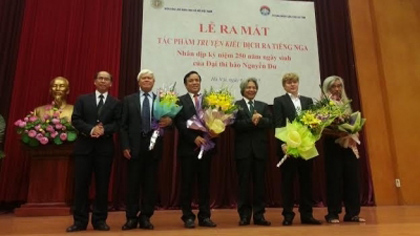Nguyen Du's legacy in Russian makes debut
The Vietnam Academy of Social Sciences (VASS) and the Ha Tinh provincial People’s Committee organised a ceremony to debut the Russian version of the legacy of the great poet Nguyen Du - ‘Truyen Kieu’ (the Tale of Kieu) to celebrate his 250th birthday.
 |
| Translators receive congratulatory flowers from leaders of the VASS and Ha Tinh province. |
The tale of Kieu was translated into Russian by both Vietnamese and Russian researchers who took part in cultural exchange programmes between Vietnam and Russia over a long period of time, including Dr. Nguyen Huy Hoang, translators Doan Tu Huyen and Vu The Khoi, poet Vasili Popov, Russian Vietnamologist Professor Associate Anatoli Socolov.
The work was translated into Russian under КИЕУ or Стенания стерзанной души from the Vietnamese version by Professor Nguyen Thach Giang starting in 2013.
Dr. Hoang said that translators translated the work’s meaning into Russian with the original literary art of the most famous masterpiece of Vietnamese literature, responding to expectations of many Russian translators loving the Tale of Kieu and Vietnamologists.
Buianov expressed his hope that not only the Tale of Kieu but also further Vietnamese literary works would be translated into Russian.
According to VASS Vice President, Professor Dr. Vo Khanh Vinh, the Tale of Kieu has been translated into over 20 different languages with over 30 translated versions. In Russia, the masterpiece was taught and studied at universities.
This version is significant in connecting the two nations’ culture, helping Russian readers and people further understand the land and people of Vietnam.
Nguyen Du (1766-1820), also known as To Nhu and Thanh Hien, was recognised by UNESCO as a World Cultural Celebrity among 108 others in 2003.
His most influential work, The Tale of Kieu, is a 3,254-line classic verse novel written in ‘luc bat’, the form that consists of alternating lines of six and eight syllables, a traditional verse form of Vietnam's poetry.
Kieu's story is vastly popular in Vietnam; many people know the epic by heart and it has been translated into 20 different languages including French, Chinese, English, Russian and Japanese.
(Source: nhandan.org.vn)
 về đầu trang
về đầu trang







